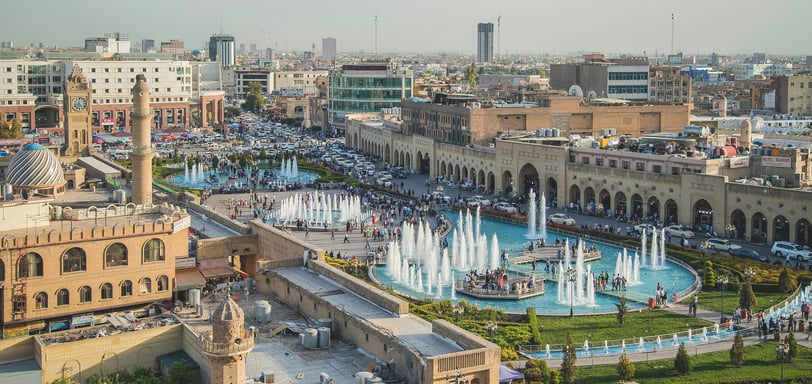The Baghdad Job: How the Iraqi elite stole 2.5 billion dollars
Think Ocean’s Eleven, but real—and way messier. Dive into the jaw-dropping story of how Iraq’s elite pulled off one of the biggest money heists in modern history, stealing $2.5 BILLION straight from government coffers. Corruption, power, and receipts—it’s all here. Subscribe to our newsletter to read the story
LONGER INVESTIGATIVE
Atharva Chokhani
5/8/20244 min read


The Investigation
In mid-2022, word started spreading that the Iraqi government has lost billions of dollars in tax payer money. To combat this, the finance minister launched an investigation to understand where these funds went, and spearheading this investigation was Hussein Kanber, an Iraqi born banker who spent much of his adulthood in Stockholm.
Account number 60032 at Rafidian bank was said account which was stolen from. It was a lucrative target to those who knew its secret. Oil companies and other establishments in Iraq had to pay taxes when they receive a contract. The Iraqi tax authority would keep these deposits in account 60032. If a company fails to earn as much profit as expected, they could claim rebates, earning back a portion of their taxes, but, behind the curtains of bureaucracy, this process was practically non existent.
As the investigation started, and the accountants acquired the balance sheet of account 60032, they realized that in the span of a year, the entire bank account had been drained. When trying to figure out where this money went, they realized that all the stolen cash went to 5 companies, which were completely unheard of.
This is the part of the story where Iraq’s politics come into play, and the sheer inefficiency and corruption in the government starts to show.
To understand this, we need to get a grasp on Iraq’s political scene. There are mainly two groups, one being a Western-backed faction, and the other being a Iran backed faction. This makes Iraq the battleground for the US and Iran’s power conflicts, with both trying to assert influence.
The prime minister of Iraq during the investigation was Mustafa Kadhimi, a member of the western camp. Against him was the Iranian block, known as the Fatah alliance, who controlled the tax authority. They generally bore signs of new wealth, with flashy suits and cars.
By the summer of 2022, Khadimi’s government had disintegrated, leaving the Fatah alliance with the opportunity to appoint a new prime minister. This caused the Khadimi government to become immensely reliant on this new investigation, as it was their only shot at political survival. Fittingly, they tried to rush the report, and tried to get it out before a no confidence motion held against the prime minister on the 11th of October.
Kanber, who was heading this investigation, could feel the weight on his shoulders pilling up like mountains. He crossed every T, dotted every I before he released that report. He checked with 30 oil companies in Iraq, making sure they claimed no rebate in the past year. On the 10th of October, he finally finished the report, ensuring that it presented undeniable evidence to Parliament the next day.
The thief
The 5 companies who drew money from the account had links to one man, with 2 of the companies being directly owned by him. This man was Nur Zuheir, a 41 year old man who was immediately arrested following the report.
So, how did he do it?
Nur knew how to get work done in the corrupt nation of Iraq. He understood that bribes were the only way he could pull this off. According to The Economist, he knew how to make friends quickly. A politician interviewed by them revealed that it would start with gifts like watches and jewelry. Then, it would progress to cash, which was delivered by middlemen. These presents would be accompanied by requests to sign off on contracts or appointments.
Zuheir managed to get cheques from the tax authority for account 60032. Normally, this process would have taken ages, as the cheque would need to travel through the Iraqi tax authority’s inefficient systems, requiring the signature of 12 individuals. But Nur, being Nur, bribed, threatened, and coerced the employees to get these cheques in lightning-fast time periods.
Another obstacle in Nur’s path, the tax authority’s oversight body who had to give permission to issue large cheques, was dissolved in 2021 on the request of a senior official.
The logistics of his operation were impressive,to say the least. The highest denomination note in Iraq was the 50,000 dinar which was worth approximately 35$, so smuggling 2.5 billion would be a challenge
When Nur wanted to claim this money, he would send people under his payroll to the tax authority’s office, where an official would sign on the order. Next, the cheque would be issued by a small Rafadian bank branch located on the ground floor. This cheque would be cashed in the nearby branches.
It’s not really known what Nur did with the money after cashing the cheques. Some accounts claim he spent it in Iraq, purchasing lavish property for himself. Others say he converted it into dollars and smuggled it out of the country.
Normally, passengers have to go through numerous security layers at Baghdad airport, making smuggling a hard task, but there was another passage with minimal security which would have allowed Nur to smuggle his money. This was the intelligence agency’s lounge, which, unlike the dingy passenger hall, was clad in marble tiles and built with opulence in mind. He apparently took 20 international trips between 2021 and 2022, in which he was able to take much of the cash overseas
Iraqi Politics
Nonetheless, even after this exposé, Khadimi’s government toppled, and in his place was a new prime minister, Muhammad Sudani, a Fatah Alliance pick. Sudani embraced the investigation, and claimed he would aid in it. He even held a press conference where he was flanked by piles of cash, which were said to be recovered from the heist.
Shortly after, Nur Zuheir was released on two week bail by the courts, which claimed it was to allow for the recovery of more money. In April 2023, some of his assets were even unfrozen. When asked about Nur’s release by the 1843 Magazine, a spokesman for Sudani claimed it was the court’s decision, not the governments.
Soon, the investigation took a new turn under Sudani’s government. The focus changed from Nur to the people who were involved in the investigation.
Alas, the people who actually benefited from this heist will probably be held in accountable for their crimes. The Iraqi people are the ones who actually suffered, with public money being stolen. On the outside, Iraq may look like a functioning democracy, but this story sheds light on the inner problems within government.
Maybe this new capital will help Iraqi citizens, as it's being injected into the economy instead of sitting in a bank account. This can be seen in the various new developments in cities, with apartment complexes, restaurants and cafés popping up everywhere.
More Stories...
Engage
Making news relatable for Gen Alpha readers.
Connect
Inspire
chokhaniatharva@gmail.com
+91 9954061444
© 2025. All rights reserved.
